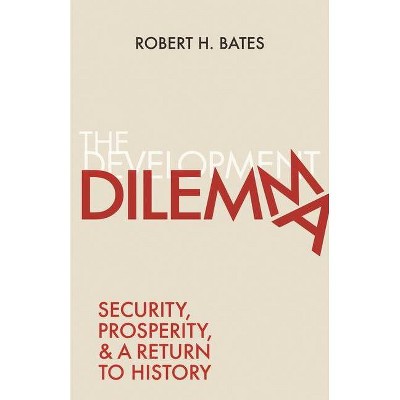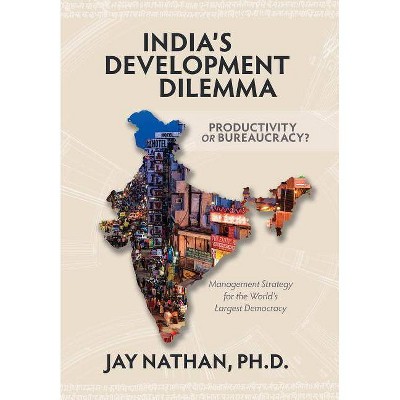The Development Dilemma - by Robert H Bates (Paperback)

Similar Products
Products of same category from the store
AllProduct info
<p/><br></br><p><b> Book Synopsis </b></p></br></br><p><b>Reassessing the developing world through the lens of Europe's past</b> <p/>Today's developing nations emerged from the rubble of the Second World War. Only a handful of these countries have subsequently attained a level of prosperity and security comparable to that of the advanced industrial world. The implication is clear: those who study the developing world in order to learn how development can be achieved lack the data to do so. <p/>In <i>The Development Dilemma</i>, Robert Bates responds to this challenge by turning to history, focusing on England and France. By the end of the eighteenth century, England stood poised to enter "the great transformation." France by contrast verged on state failure, and life and property were insecure. Probing the histories of these countries, Bates uncovers a powerful tension between prosperity and security: both may be necessary for development, he argues, but efforts to achieve the one threaten the achievement of the other. A fundamental tension pervades the political economy of development. <p/>Bates also argues that while the creation of a central hierarchy-a state-may be necessary to the achievement of development, it is not sufficient. What matters is how the power of the state is used. France and England teach us that in some settings the seizure and redistribution of wealth-not its safeguarding and fostering-is a winning political strategy. These countries also suggest the features that mark those settings-features that appear in nations throughout the developing world. <p/>Returning to the present, Bates applies these insights to the world today. Drawing on fieldwork in Zambia and Kenya, and data from around the globe, he demonstrates how the past can help us to understand the performance of nations in today's developing world.</p><p/><br></br><p><b> From the Back Cover </b></p></br></br><p>"In <i>The Development Dilemma</i>, Robert Bates turns to European history and Africa today to make a provocative argument: countries that throw different ethnic groups and regions together end up cutting deals that trade off growth to obtain stability. These kinds of historical comparisons are too rare and why this book is so important."<b>--Chris Blattman, University of Chicago</b></p><p>"<i>The Development Dilemma</i> offers an elegant account of why some countries flourish when others do not. Familism, regionalism, colonialism, migration, institutions, and culture are important, but the resolute focus is on sources of political power. How key actors play the political game largely determines the consequent distribution of security, prosperity, and justice. Drawing on politics, economics, and world history, Robert Bates proves himself once again the doyen of development theory."<b>--Margaret Levi, coauthor of <i>In the Interest of Others</i></b></p><p>"This is a major contribution to debates on the political economy of development. Robert Bates examines the microfoundations of political decision making in early modern England and France to shed light on the terrain that shaped politics in modern Kenya and Zambia. He connects these case studies to an insightful, original argument on the political choices that foster or obstruct economic growth. A must-read for theorists and historians of economic development."<b>--John Coatsworth, Columbia University</b></p><p>"Robert Bates's singular achievement is knitting together his case studies into one grand analytical narrative. His work is the imaginative culmination of the most important research program in contemporary political science."<b>--Mark Lichbach, University of Maryland</b></p><p>"With forceful prose and vivid case studies, <i>The Development Dilemma</i> makes a significant contribution not just to the study of political and economic development but also to the social sciences more broadly."<b>--Philip T. Hoffman, author of <i>Why Did Europe Conquer the World?</i></b></p><p/><br></br><p><b> Review Quotes </b></p></br></br><br>This is a beautifully written book that will add much to the scholarly discourse on the origins of comparative development. By looking to medieval Europe for insights on contemporary development, it presents a rare and valuable analysis that has important lessons for all readers. . . . It is an essential addition to a paramount research agenda.<b>---Eoin McGuirk, <i>EH.net</i></b><br><p/><br></br><p><b> About the Author </b></p></br></br><b>Robert H. Bates</b> is the Eaton Professor of the Science of Government and professor of African and African American Studies at Harvard University. His books include <i>Open-Economy Politics</i> and <i>Analytic Narratives</i> (both Princeton).
Price History
Cheapest price in the interval: 19.99 on October 27, 2021
Most expensive price in the interval: 19.99 on December 20, 2021
Price Archive shows prices from various stores, lets you see history and find the cheapest. There is no actual sale on the website. For all support, inquiry and suggestion messagescommunication@pricearchive.us




















